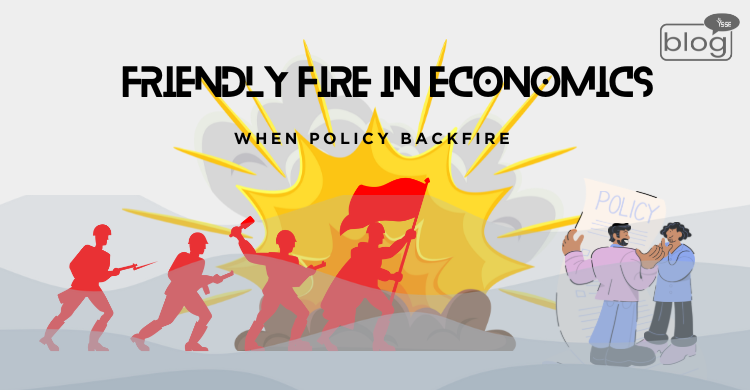Friendly fire is a military term used inside the US Army. It indicated the unintended fire made by Allied forces due to confusion and chaos on the battlefield. Nobel laureate Indian economist Amartya Sen first introduced the term “friendly fire” in the economics universe. In 2016, this term was widely used in economics due to the Russian trade sanction.
In economics, friendly fire refers to those policies that were built either to give a solution to a problem or to accelerate growth and appear to have become a backward force to worsen the situation. The policy made to improve the situation produced unintended side effects that degraded the ultimate outcome.
We can dive more into this topic by learning who is pressing the trigger on this battlefield, which ultimately causes friendly fire for society and the economy. It is the government. Economists categorized government failure in two forms: 1. error of omission. 2. Error of Commission. But in the case of friendly fire, neither of these failures of government occur; instead, there remains a negative consequence of government action or policy.
We can look more closely by analyzing a few case-friendly fires that happened in different countries, including Bangladesh.
Trade sanctions imposed by Western nations against Russia in 2014 over its actions regarding Ukraine had the effect of an attempt to weaken the latter’s economy. Still, this move brought unplanned impacts upon farmers in Europe. Moscow banned food imports from the EU in response—a vital market for European produce. Consequently, the farmers suffered huge losses with their unsold commodities piling up, surpluses leading to falling prices. Intended to hurt Russia, these sanctions have instead hit the EU farmers, turning out to be a classic case of friendly fire in economic policy.
In the 1960s, a series of polders was constructed to keep out the seawater and increase rice production along the Bangladesh coast. While initially successful, these polders prevented the natural process of sedimentation, which caused long-term flooding. Crops began to fail, water became polluted, diseases spread, and families were displaced. Places like Bil Dakatiya and Bhavadah had gradually turned into disaster zones, standing examples of how well-meant policies can go terribly wrong.
In the 1960s, Bangladesh installed hand pump tube wells for clean drinking water to decrease cholera and other diseases. The program was successful in improving health and increasing life expectancy. Years later, many of the tube wells were found to contain lethal levels of arsenic. This is a good example of how a solution can actually backfire when risks are not understood, harming the people it was intended to help.
West Bengal raised primary school teachers’ salaries to improve education, but the quality worsened instead. Many teachers skipped classes, especially in poor areas, leaving students without proper learning unless they could afford private tutors. The problem wasn’t just low pay; it was also poor oversight, caste discrimination, and strong teacher unions protecting their interests. It was supposed to be the policy to fix education; instead, it failed those very students it was to help—clearly, a case of friendly fire.
India has done exceptionally well in food production, with government food stocks touching 5.53 crore metric tons in 2012, much more than the required for emergencies. However, malnutrition is still rampant, worse than in sub-Saharan Africa. The government’s food policy supports farmers with high prices for crops and provides subsidized grains for consumers. However, this policy benefits the wealthy groups more than the poor and raises the prices of food, making it even harder for the poor to afford food. Without poverty and low income being addressed, this policy has not reduced hunger but has turned into friendly fire against the poor.
In other words, friendly fire in economics reveals how the very policies meant to help often destroy. Well-intentioned government actions can go awry, aggravating problems instead of solving them. These examples are a pointer to the fact that careful planning with consideration for all possible consequences is called for before implementing policies.
To read more blogs, click here
Writer
Fazlul Karim,
Intern, Content Writing Department
YSSE

